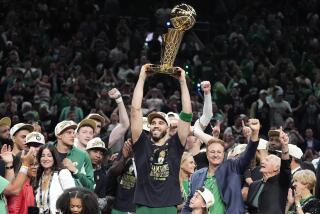He Gets the Most of a Call
- Share via
You probably thought the most famous cry in Boston history was “The British are coming” by Paul Revere. It was, until 1965. That’s when Johnny Most, the gravel-throated radio announcer for the Boston Celtics, rasped hysterically, “Havlicek stole the ball! Havlicek stole the ball!”
Havlicek’s steal preserved a 110-109 victory over Philadelphia in the seventh game of the Eastern Conference playoffs. The Celtics went on to beat the Lakers for the championship in five games.
Larry Bird made a game-saving steal in the fifth and deciding game against Philadelphia this year, and Most was asked if he called it the same way.
“No,” he said, “it wasn’t as dynamic. In 1965, a dynasty was on the line. On Havlicek’s steal, I blew my top. I was a little more in control this time.”
The New York Times obtained a tape of the broadcast. Here is Most’s call, and you can judge how “in control” he was:
“Toney holds the ball--and Bird steals it. Bird steals it! Bird steals it! Oh my, Bird stole the ball from Toney. He just took it out of his hands! He gets it over to Ainge and that’s it. It’s all over! It’s all over! A great steal by Bird at the end of the ball game! A great steal right out of Toney’s hands!
“It’s all over! Oh my! Again, this time on defense, Bird saved the ball game!”
Trivia Time: Name the only NBA coach who has gone to the championship finals with teams from three different cities. (Answer below.)
On May 9, 1982, in what became known as the Mother’s Day Massacre, Boston defeated Philadelphia by 40 points, 121-81, in the first game of the Eastern Conference playoffs. Philadelphia won the next game, 121-113, and went on to win the series in seven games.
In Game 3 of last year’s championship playoffs, the Lakers beat the Boston Celtics by 33 points, 137-104, to take a 2-1 lead in the series. The Celtics won the next game, 129-125, in overtime and went on to win the series in seven games.
Get the point?
Add Blowouts: The most dramatic proof that margins of victory are meaningless came in the 1960 World Series between the Pittsburgh Pirates and the New York Yankees. The Yankees won games by scores of 16-3, 10-0 and 12-0, but the Pirates won the series. In their four wins, the Pirates outscored by Yankees by a total of seven runs.
Just Asking: If K.C. Jones and Red Auerbach truly believe that the new 2-3-2 format gives the Lakers the advantage, since they get three straight games at home, why did the Celtics fight so hard to get the best overall record? All they had to do is drop a game here and there, and they could have had it going the other way.
The following is from an editorial in the Indianapolis News after the first Indy 500 on May 30, 1911: “Interesting and thrilling as was the race at the Speedway yesterday, it is to be hoped we have seen the last of these 500-Mile contests.
“The winning driver said that the limit had been reached and that the strain of the participants was far too great . . . So it seems we have gone too far in this form of sports . . . “
Note: The winning driver was Ray Harroun. Driving a Marmon, he averaged 74.59 m.p.h.
Trivia Answer: Alex Hannum. He went to the finals with the St. Louis Hawks in 1956-57 and 1957-58, the San Francisco Warriors in 1963-64 and the Philadelphia 76ers in 1966-67. He split with the Hawks, won with the 76ers and lost with the Warriors.
Quotebook
Boston Celtic Coach K.C. Jones, on why he doesn’t dwell on statistics: “Bill Russell’s father once told me he saw a guy drown in water that averaged three feet deep. What does that tell you about stats?”
More to Read
All things Lakers, all the time.
Get all the Lakers news you need in Dan Woike's weekly newsletter.
You may occasionally receive promotional content from the Los Angeles Times.







